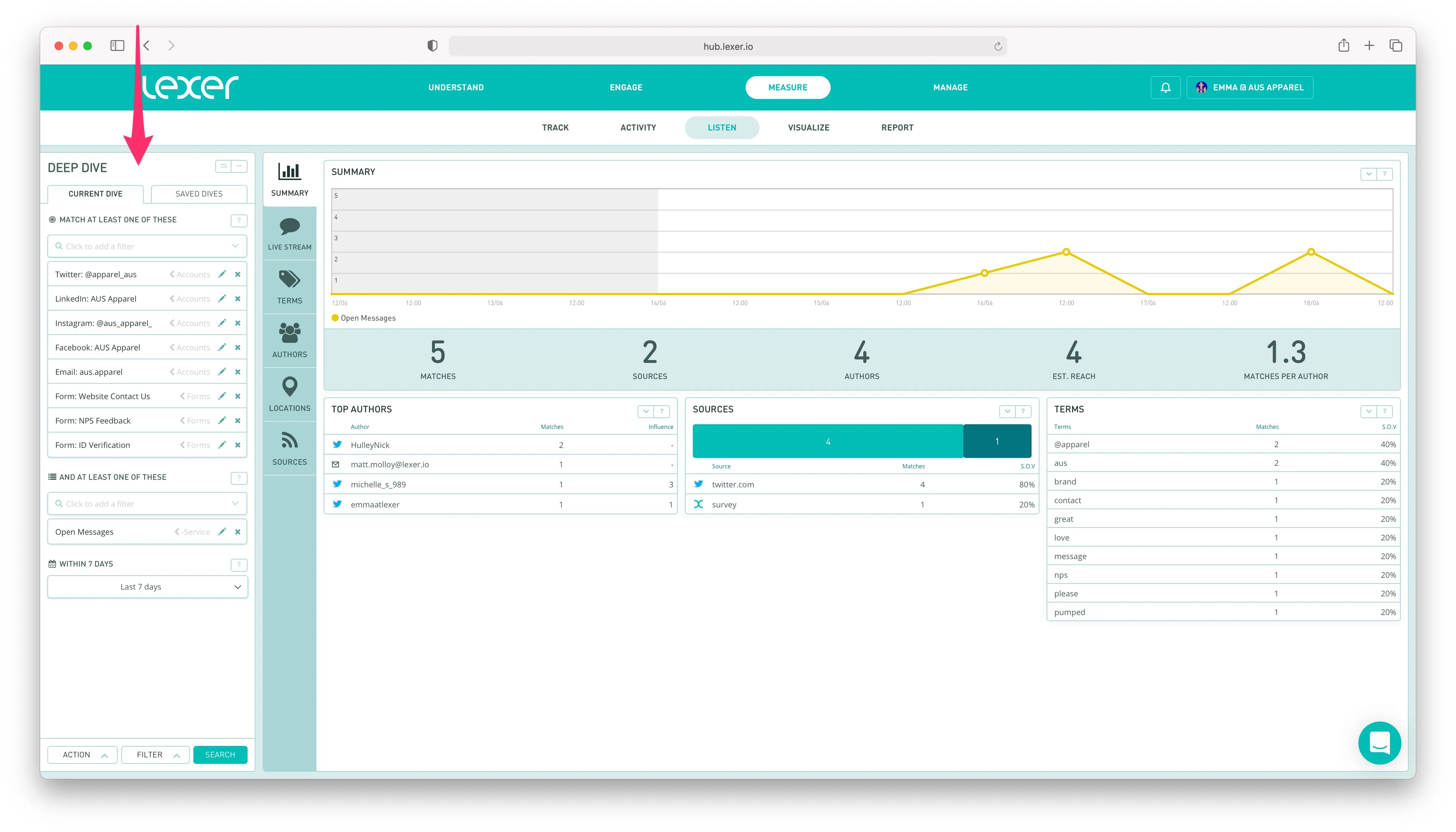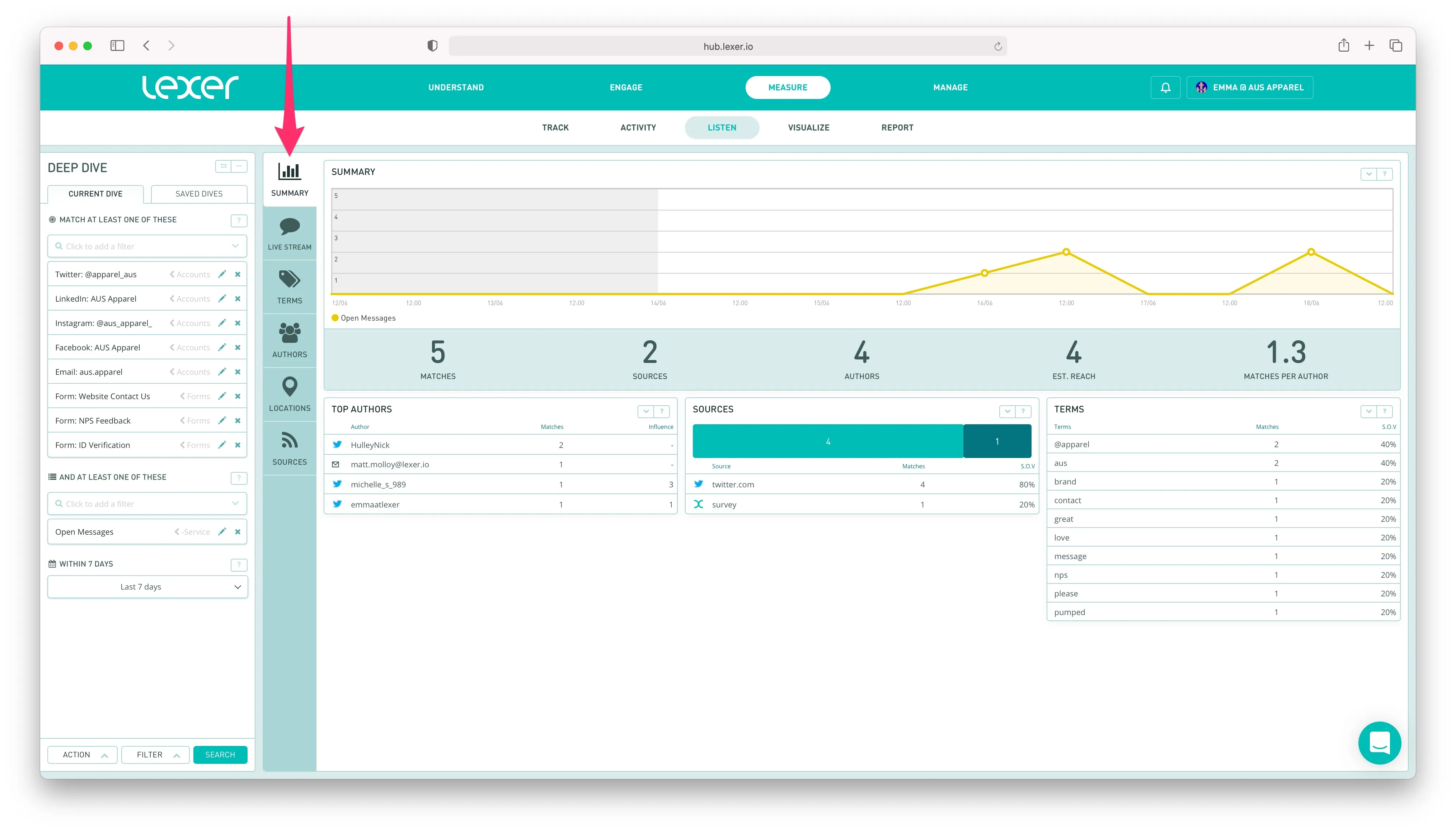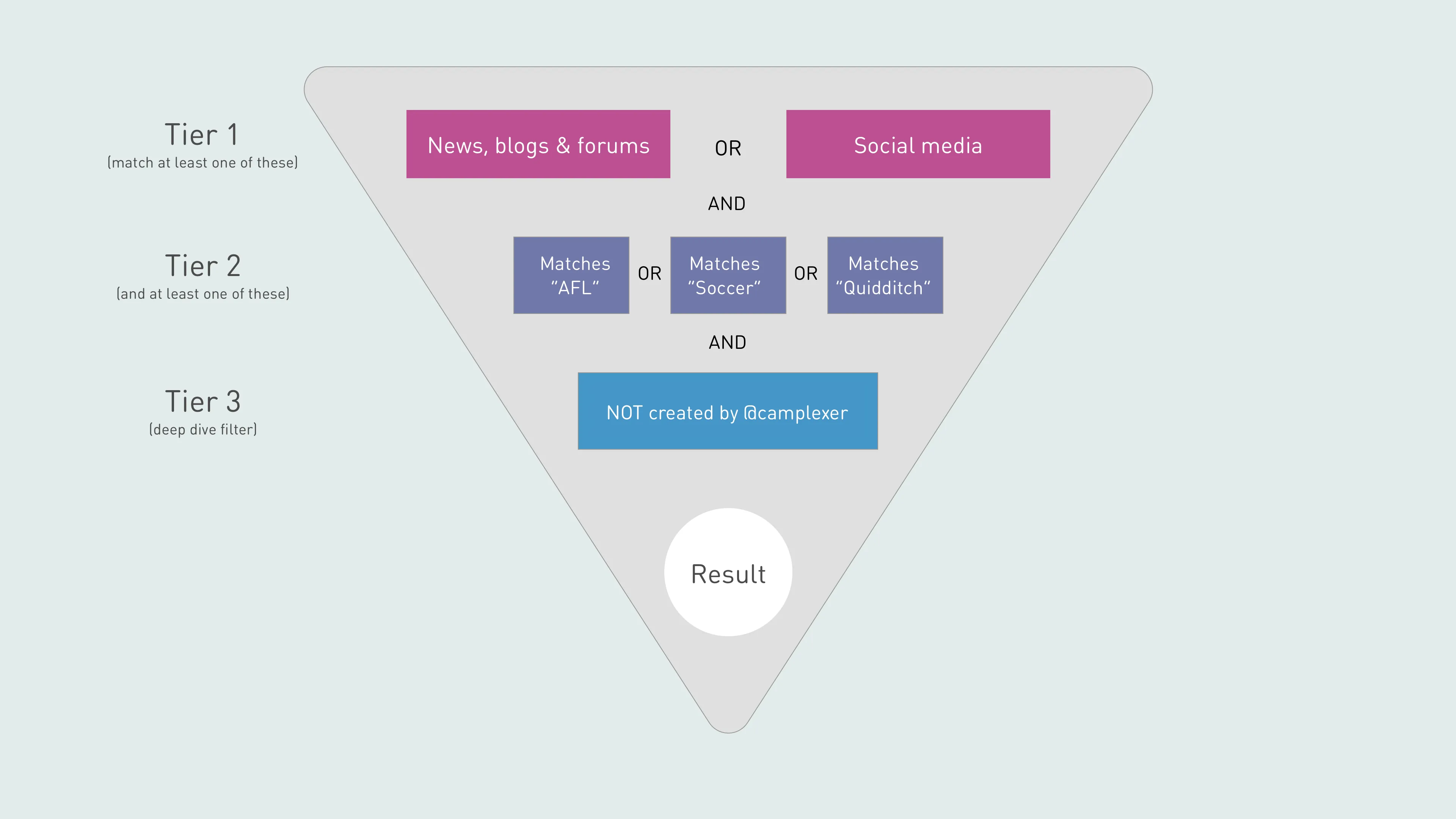Listen overview
An introduction to your digital listening tool
Lexer Listen is a powerful search tool that allows you to monitor social, forum, and news content from across the web. Here we'll show you how to easily search, vizualise, and analyze data from a huge range of sources.
Navigating Lexer Listen
When you land in Listen, you’re presented with a column on the left of your screen. We call this the Deep Dive. This is where you’ll conduct your search for content across the internet.

Listen is made up of 6 screens on which to view your search results, and each one provides detail on different data points.

Conducting a search
Searching for content in Lexer Listen is dependant on a hierarchy of filters. Each one is built with criteria that asks the internet for certain information, and they work together to gradually hone in on exactly what you’re looking for. To achieve this, your search relies on Tier Filters, which work by gradually refining your search, layer by layer. Think of it like this:
Once we have all 3 tiers in place, we’ve now refined our search from tens of millions, down to only a few really relevant results.
Learn more about the different types of filters you can use to compile your search, and how to build them with our handy guide to Tier Filters.
Running a search
Your team’s Listen setup will likely have a few pre-configured searches (Saved Dives) you use regularly, but what if you want to search for something that hasn’t been configured?
Generally, you’ll have existing Tier Filters you can use to build your own search. If not, refer back to our Tier Filters article to set these up now.
Then, build your search in 5 easy steps:
- Head to the first dropdown menu in your Deep Dive and select your Tier 1 Filter. This is WHERE you want to conduct your search - for example, Facebook (using a 'Source Name' filter).
- Select your Tier 2 Filter from the dropdown menu below that. This is WHAT you’re looking for, from within your Tier 1 - for example, mentions of @camplexer (using a 'Mentions Author' filter)
- Choose the date range you’d like to search within.
- Add any additional filters (Tier 3) that could help narrow down your results further - for example, NOT Lexar (using a 'Matching Terms' filter)
- Click 'Search'.
Here’s a visual representation of how you might build a search using multiple filters at each level:

Searching for keywords and phrases
When you search for something in Google, this uses Boolean logic. Lexer Listen uses the same approach, but gives you the power to control how this search is built, so that only relevant content is returned.
Read our guide on boolean search for a comprehensive look into how this works.
Saving your search as a Saved Dive
If you’re happy with your current search, you can now save this as a dive that you can access later.
Check out our guide on Saved Dives for more information on how to do this.
Analyze your results
On the surface
Each screen in Listen will present you with:
- A volume chart: This runs along the top of the screen, and shows the volume of the data presented in that screen, over the given timeframe you’ve selected.
- A summary: The big numbers that round up all data on your chosen screen to give you context and scale.
- Data tables: A breakdown of the data for that category - your results in lists, sorted by largest volume/most recent/highest value.
Dig a little deeper
All charts and tables in your results screens have a button in the top right corner that give you options to further analyze your data.
On some, it will give you the option to sort the table’s contents in a different order to get a new perspective.
On all, it will give you the option to Export to CSV. This provides you with a spreadsheet of the raw data, to conduct your own external analysis.
Report on your findings
Share your results at scale, and show trends and comparisons in the form of:
[#troubleshooting-listen-errors]Troubleshooting errors[#troubleshooting-listen-errors]
If something's wrong with your search, we try to offer a message that provides some insight to help you debug. Here are some errors you may encounter, and what they mean.
"There was an error executing your search. Please try again"
This generally populates when there are one or more errors in your overall search. If the error relates to one particular component or filter in your search, this should show as an additional message at the bottom of your Deep Dive, and could be one of the following:
The date range you have supplied is outside the allowed range, if you need data beyond this boundary please contact Lexer
You can search up to the last 400 days of content in Lexer Listen, in 90 day blocks. To view data beyond this date range, head into Activity, where you can analyze conversation history across a greater date range. You can also export the data from here for your own analysis. If this data isn’t what you’re looking for, reach out to Lexer Support (support@lexer.io) to discuss other options.
The date you supplied is invalid
If you’ve entered your date into the field manually, this message is to inform you that the format is incorrect. To correct this, the format should be DD/MM/YYYY, and ensuring the range is no more than 90 days.
There are no results
No results have been returned in this search. Your search could be looking for something very specific, and there are no mentions with the criteria you’ve selected. Try broadening your search, then gradually hone in by narrowing your list of source types, author names etc.Also check that your filters aren’t conflicting. For example, your Tier 1 filter is looking for content on social media, but you have a Tier 2 filter that’s looking for new mentions in news articles and forum posts. Our article on finding conversations may be insightful for this type of search.
"ISSUE WITH YOUR DEEP DIVE"
This error will tell you that one of the filters in your search has been formatted incorrectly, or is likely to restrict your search. To follow, will be a helpful pointer to the part of your search causing this, such as:
Using geographical detail is very limiting
Location filters will only pull in content that has geographical data associated with it. If no location data has been supplied by the page/account/author of the content, then this will not be captured in this search.
One of more of your filters is invalid. Check your query for missing quotes, brackets, ANDs or ORs.
There is an issue with your boolean in a filter that uses a free text field. Check out our guide to using boolean logic to help correct this. We also recommend using a text editor to clearly spot and fix errors in long strings of boolean.

